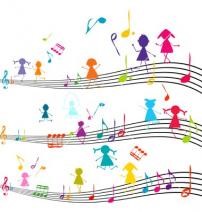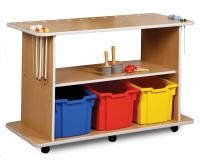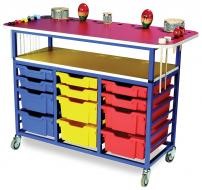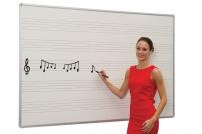Songs, rhymes and musical instruments are a great way to help children progress their language and communication skills. It’s never too late or too early to start introducing music into a child’s lifestyle.
Studies show that young adults that had musical training before the age of seven have thicker regions of the brain that deal with hearing, self-awareness, language skills and executive function, which is a person's ability to plan and carry out tasks.
"Early musical training does more good for kids than just making it easier for them to enjoy music. It changes the brain and these brain changes could lead to cognitive advances as well" said Yunxin Wang of Beijing Normal University.
Another benefit of music in early years is that it encourages movement. Music gives children the urge to move and dance. This gives them a sense of rhythm and aids a child’s development and growth. Rhythms and melodies in music also provide exercise for the brain and help to advance memory.
For example: Who learnt the alphabet without the ABC song?
Not only is music fun, it’s a great way for children to socialise. Children’s communication skills develop at different rates but there are many things that parents and teachers can do to help a child’s skills flourish.
Instruments are a great way to inspire children to join in with music sessions, when they play the instruments it makes them feel more involved with the task.
Many preschools, nurseries and primary schools have music sessions every week to give children a break from academic lessons but in a way that they are still learning. Children enjoy making, dancing and listening to music.
Rhymes help children to learn and play with words, they tune their ears to all the sounds in the word. By hearing different sounds, they learn how sounds combine and blend together to form a word. It is said that a child who knows four nursery rhymes by the time they’re four will be a better reader at eight years old because of it.
When singing nursery rhymes, it is a good idea to sing slowly and clearly. This is so the children have a chance to catch the words and the way they’re formed. If you can, ask your child to face you, the eye contact will help to ripen their non-verbal communication skills.
Songs and rhymes have a positive impact on a child’s language and literacy development. Children love rhyme, rhythm and repetition. These three things found in songs and rhymes can naturally help to boost a child’s language and literacy skills.
There are many benefits to starting early with songs and rhymes. Studies have shown that children who enjoy music, singing and rhyming on a regular basis tend to learn how to speak more easily.
They have more words to express themselves and they are more confident and creative. Children also find reading and spelling easier to learn at school.
Music and rhymes also help children learn to hear and repeat a steady beat. Research has shown that children who can keep a steady beat are often better readers. So while you’re singing and rhyming be sure to clap along to give children a chance to feel and listen to the beat through tapping, clapping or marching.
What’s the most important reason to sing and rhyme with a child?

It gives them a love of language. And this love of language, books, singing and rhyming will form a solid foundation that will help children value learning.
So take some time every day to sing and rhyme with your child. As you go through your day, make up silly songs and rhymes. To get the children more interested in music, use active songs and rhymes during playtime, and at bedtime, try a lullaby. The benefits will stick with them forever.
Here at Early Learning Furniture we understand the importance of music within the early years’ foundation stages and we provide you with the equipment you need to create a stimulating and exciting musical environment.
See our Musical Instruments Trolley, Music Trolley with 12 Variety Trays and Whiteboard with Music Staves.
The trollies for musical instruments are a fun and creative way of storing and transporting your musical instruments. The trollies have 3 jumbo sized school trays and various sized recessed slots for easy storage. The trolley finished with modern beech and has easy glide wheels for easy movement.


Our Music Trolley with 12 Variety Trays has a blue frame and red and yellow shelves with 3 shallow and 3 deep school trays. It also has recessed slots and an additional shelf for easy storage.
The music staves white board is an Ideal whiteboard for use in classrooms and schools. This white board comes with pre-printed markings, you can choose from three different designs (music staves, 50mm squares or 75mm lines). It is wall mounted with concealed fixings and has an aluminium frame with rounded corners. White board accessory pack is also available.

At ELF we are experts in early years’ educational resources and supply classroom furniture, library furniture and equipment to primary schools, pre-schools, nurseries and playgroups. For more information about our products please contact us or call our sales team on 01733 511121
What songs do you sing with your child? Let us know on Facebook or Twitter.
Permalink:
https://www.earlylearningfurniture.co.uk/blog/learning-with-music.aspx